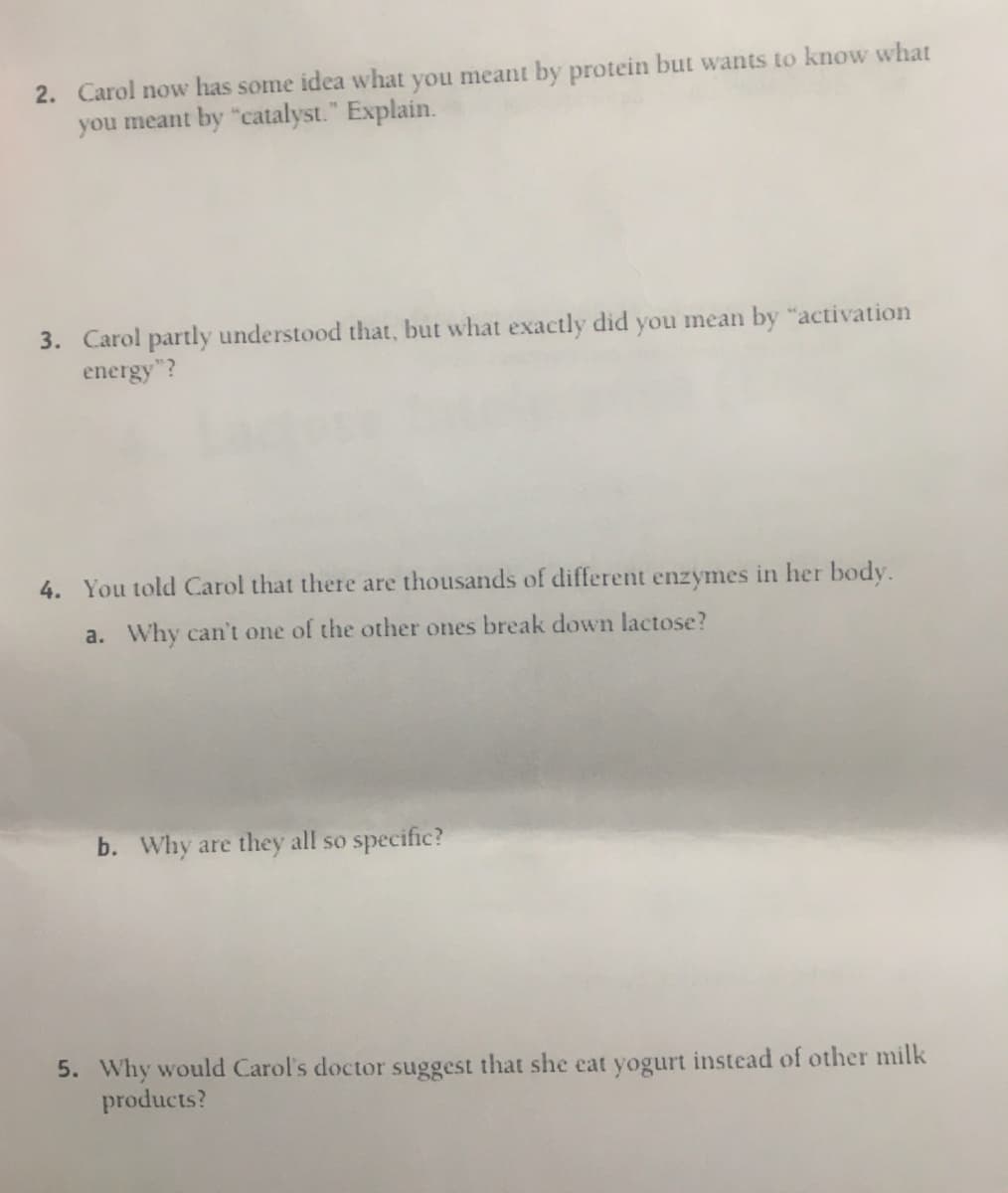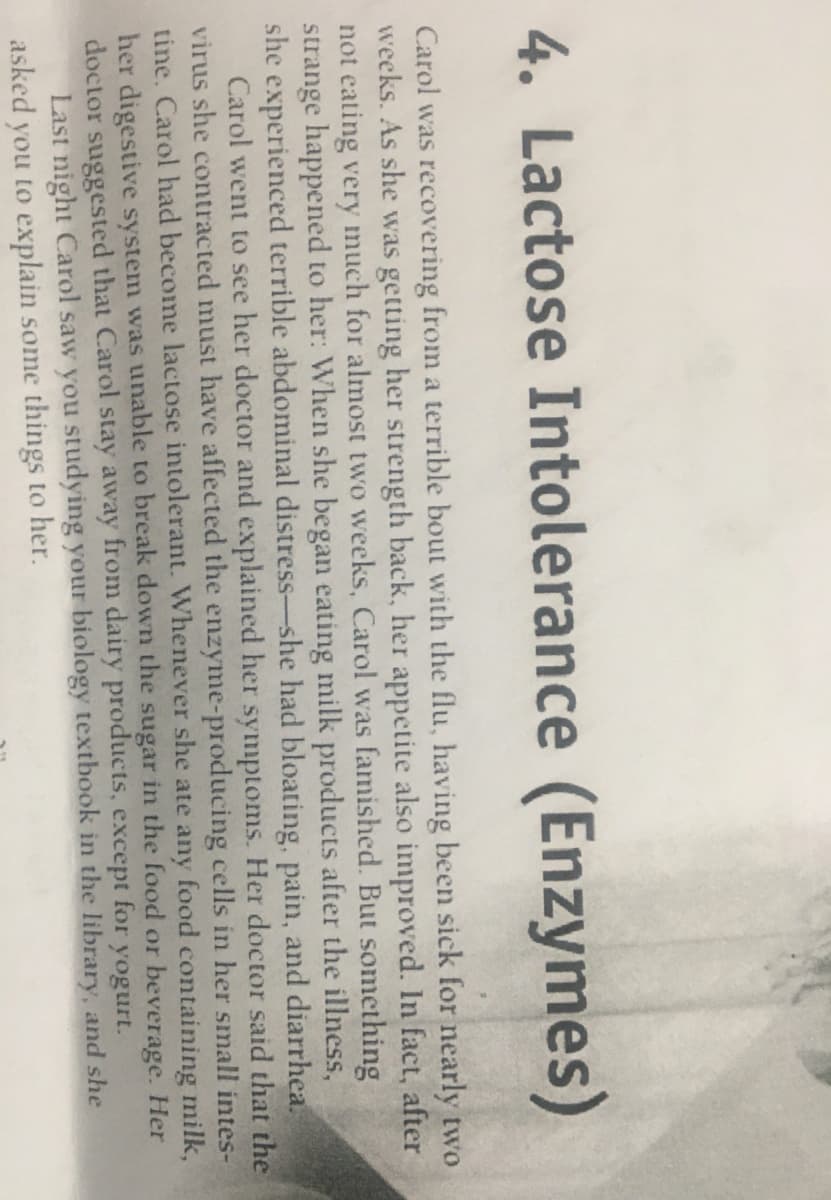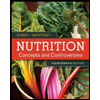2. Carol now has some idea what you meant by protein but wants to know what you meant by "catalyst." Explain. 3. Carol partly understood that, but what exactly did you mean by "activation energy"? 4. You told Carol that there are thousands of different enzymes in her body. a. Why can't one of the other ones break down lactose? b. Why are they all so specific? 5. Why would Carol's doctor suggest that she eat yogurt instead of other milk products? 4. Lactose Intolerance (Enzymes) Carol was recovering from a terrible bout with the flu, having been sick for nearly two weeks. As she was getting her strength back, her appetite also improved. In fact, after not eating very much for almost two weeks, Carol was famished. But something strange happened to her: When she began eating milk products after the illness, she experienced terrible abdominal distress-she had bloating, pain, and diarrhea. Carol went to see her doctor and explained her symptoms. Her doctor said that the virus she contracted must have affected the enzyme-producing cells in her small intes- tine. Carol had become lactose intolerant. Whenever she ate any food containing milk, her digestive system was unable to break down the sugar in the food or beverage. Her doctor suggested that Carol stay away from dairy products, except for yogurt. Last night Carol saw you studying your biology textbook in the library, and she asked you to explain some things to her.
2. Carol now has some idea what you meant by protein but wants to know what you meant by "catalyst." Explain. 3. Carol partly understood that, but what exactly did you mean by "activation energy"? 4. You told Carol that there are thousands of different enzymes in her body. a. Why can't one of the other ones break down lactose? b. Why are they all so specific? 5. Why would Carol's doctor suggest that she eat yogurt instead of other milk products? 4. Lactose Intolerance (Enzymes) Carol was recovering from a terrible bout with the flu, having been sick for nearly two weeks. As she was getting her strength back, her appetite also improved. In fact, after not eating very much for almost two weeks, Carol was famished. But something strange happened to her: When she began eating milk products after the illness, she experienced terrible abdominal distress-she had bloating, pain, and diarrhea. Carol went to see her doctor and explained her symptoms. Her doctor said that the virus she contracted must have affected the enzyme-producing cells in her small intes- tine. Carol had become lactose intolerant. Whenever she ate any food containing milk, her digestive system was unable to break down the sugar in the food or beverage. Her doctor suggested that Carol stay away from dairy products, except for yogurt. Last night Carol saw you studying your biology textbook in the library, and she asked you to explain some things to her.
Biology: The Dynamic Science (MindTap Course List)
4th Edition
ISBN:9781305389892
Author:Peter J. Russell, Paul E. Hertz, Beverly McMillan
Publisher:Peter J. Russell, Paul E. Hertz, Beverly McMillan
Chapter47: Animal Nutrition
Section: Chapter Questions
Problem 7TYK: If the fat in whole milk is ingested: a. the stomach, with its high pH, will stimulate cells of the...
Related questions
Question

Transcribed Image Text:2. Carol now has some idea what you meant by protein but wants to know what
you meant by "catalyst." Explain.
3. Carol partly understood that, but what exactly did you mean by "activation
energy"?
4. You told Carol that there are thousands of different enzymes in her body.
a. Why can't one of the other ones break down lactose?
b. Why are they all so specific?
5. Why would Carol's doctor suggest that she eat yogurt instead of other milk
products?

Transcribed Image Text:4. Lactose Intolerance (Enzymes)
Carol was recovering from a terrible bout with the flu, having been sick for nearly two
weeks. As she was getting her strength back, her appetite also improved. In fact, after
not eating very much for almost two weeks, Carol was famished. But something
strange happened to her: When she began eating milk products after the illness,
she experienced terrible abdominal distress-she had bloating, pain, and diarrhea.
Carol went to see her doctor and explained her symptoms. Her doctor said that the
virus she contracted must have affected the enzyme-producing cells in her small intes-
tine. Carol had become lactose intolerant. Whenever she ate any food containing milk,
her digestive system was unable to break down the sugar in the food or beverage. Her
doctor suggested that Carol stay away from dairy products, except for yogurt.
Last night Carol saw you studying your biology textbook in the library, and she
asked you to explain some things to her.
Expert Solution
This question has been solved!
Explore an expertly crafted, step-by-step solution for a thorough understanding of key concepts.
Step by step
Solved in 6 steps

Recommended textbooks for you

Biology: The Dynamic Science (MindTap Course List)
Biology
ISBN:
9781305389892
Author:
Peter J. Russell, Paul E. Hertz, Beverly McMillan
Publisher:
Cengage Learning


Anatomy & Physiology
Biology
ISBN:
9781938168130
Author:
Kelly A. Young, James A. Wise, Peter DeSaix, Dean H. Kruse, Brandon Poe, Eddie Johnson, Jody E. Johnson, Oksana Korol, J. Gordon Betts, Mark Womble
Publisher:
OpenStax College

Biology: The Dynamic Science (MindTap Course List)
Biology
ISBN:
9781305389892
Author:
Peter J. Russell, Paul E. Hertz, Beverly McMillan
Publisher:
Cengage Learning


Anatomy & Physiology
Biology
ISBN:
9781938168130
Author:
Kelly A. Young, James A. Wise, Peter DeSaix, Dean H. Kruse, Brandon Poe, Eddie Johnson, Jody E. Johnson, Oksana Korol, J. Gordon Betts, Mark Womble
Publisher:
OpenStax College

Biology 2e
Biology
ISBN:
9781947172517
Author:
Matthew Douglas, Jung Choi, Mary Ann Clark
Publisher:
OpenStax

Nutrition: Concepts and Controversies - Standalo…
Health & Nutrition
ISBN:
9781305627994
Author:
Frances Sizer, Ellie Whitney
Publisher:
Brooks Cole

Biology: The Unity and Diversity of Life (MindTap…
Biology
ISBN:
9781337408332
Author:
Cecie Starr, Ralph Taggart, Christine Evers, Lisa Starr
Publisher:
Cengage Learning